|
|
|
Sort Order |
|
|
|
Items / Page
|
|
|
|
|
|
|
| Srl | Item |
| 1 |
ID:
109127
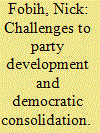

|
|
|
|
|
| Publication |
2011.
|
| Summary/Abstract |
The second half of the twentieth century witnessed the emergence of the party system and democracy in African countries, for example Ghana, in the period preceding the postcolonial era. This article looks at some of the challenges facing Ghana's democratic consolidation and party development, and some of the institutional benchmarks required to help to promote effectively an accountable, participatory and democratic party system in the country in order to consolidate further its democracy. The study concludes with the view that regardless of their apparent weaknesses, political parties in Ghana are generally important institutions that grease the wheels of the country's democratic governance in the post-transition era.
|
|
|
|
|
|
|
|
|
|
|
|
|
|
|
|
| 2 |
ID:
109129


|
|
|
|
|
| Publication |
2011.
|
| Summary/Abstract |
The aim of this article is to analyze critically the implications of Malawi's changing nature of politics on civil society organizations (CSOs). The article seeks to clarify whether or not the social, political and economic engagement of civil society organizations has contributed to a strengthened relationship between Malawi' government and its own development agenda, given the CSOs' dependence on 'Northern' aid agencies and/or international NGOs. The article argues that while the change from dictatorial regimes to a multiparty political system has enhanced civil society participation in Malawi's social, economic and political issues, the CSO-government relationship is still fraught with suspicion and mistrust.
|
|
|
|
|
|
|
|
|
|
|
|
|
|
|
|
| 3 |
ID:
109131
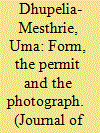

|
|
|
|
|
| Publication |
2011.
|
| Summary/Abstract |
Inspired by recent scholarship that calls for a more critical engagement with archives and knowledge production, this article plots the biography of an archive in Cape Town. Unravelling the layers of paperwork, it locates the origins of the archive in a repressive state project of excluding Indian immigrants and controlling those within the borders of the Cape Colony. The paper trail reveals documents of identity and the state's attempts to verify identity. In seeking to answer the question as to how the historian should approach such an archive of control and surveillance, it concludes that a social history and gendered approach to migration is possible and the real treasures are those documents that enter the archive beyond the limits of state intentions.
|
|
|
|
|
|
|
|
|
|
|
|
|
|
|
|
| 4 |
ID:
109130
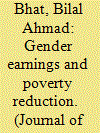

|
|
|
|
|
| Publication |
2011.
|
| Summary/Abstract |
Women get less of the material resources, social status, power and opportunities for self-actualization than men do who share their social location - be it a location based on class, race, occupation, ethnicity, religion, education, nationality, or any intersection of these factors. The process of feminization of poverty in Central Asia and Uzbekistan is intimately connected to the cultural and institutional limitations that put a ceiling on women's involvement in economic activity. This article attempts to study and explore gender in the context of poverty reduction in Uzbekistan, the most populated state of Central Asia, to understand the ways and manner in which poverty and other forms of deprivation demand women's participation in variety of contexts. The study is primarily an empirical one and is based on an extensive sociological investigation in the field.
|
|
|
|
|
|
|
|
|
|
|
|
|
|
|
|
| 5 |
ID:
109134


|
|
|
|
|
| Publication |
2011.
|
| Summary/Abstract |
The Hajj has always been affected either directly or indirectly by Iranian foreign policy. This article attempts to examine the impact of the Iranian Islamic regime's foreign policy, specifically with regard to Iranian-Saudi interaction on the Hajj, from its establishment in 1979 until 2010. Given the ideological approach dominating Iran's foreign policy, this article will illustrate how the relationship of Iran and Saudi Arabia has been especially frictive during the Hajj. However, with Iran attempting to pursue a more moderate and less confrontational foreign policy in the region and internationally, its relationship with Saudi Arabia has become cordial and peaceful of late, even during the pilgrimage.
|
|
|
|
|
|
|
|
|
|
|
|
|
|
|
|
| 6 |
ID:
109125
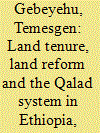

|
|
|
|
|
| Publication |
2011.
|
| Summary/Abstract |
Ethiopia has been both enriched and burdened by its past, including its land tenure system. 'Land to the Tiller' was one of the main factors for the decline and fall of the imperial period, the reign of Emperor Haile-Sellase (1941-1974). This study is essentially based on archival materials from the Wolde-Mesqel Research Center at the Institute of Ethiopian Studies, Addis Ababa University. I consulted material from the Center that deal with the subject of this article. The article examines the essential features and elements of land reform, land tenure and the qalad system (land measurement) in Ethiopia. It also tries to analyze the factors that made land measurement and land reform complex and difficult during Imperial Ethiopia. The findings suggest that most of the available literature on the government of Haile-Sellase's land tenure system lacks a sense of critical scholarship, and needs to be more comprehensive and balanced in its judgements and interpretations. It has no depth or objectivity and seems to have been written for political consumption. This article concludes by giving a comparative and contrastive analysis of some of the existing literature on land tenure, reform and measurement, using the archival materials of the Research Center.
|
|
|
|
|
|
|
|
|
|
|
|
|
|
|
|
| 7 |
ID:
109123
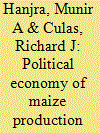

|
|
|
|
|
| Publication |
2011.
|
| Summary/Abstract |
Poverty and food security are endemic issues in much of sub-Saharan Africa. To eradicate extreme poverty and hunger in the region remains a key Millennium Development Goal. Many African governments have pursued economic reforms and agricultural policy interventions in order to accelerate economic growth that reduces poverty faster. Agricultural policy regimes in Zambia in the last 50 years (1964-2008) are examined here to better understand their likely impact on food security and poverty, with an emphasis on the political economy of maize subsidy policies. The empirical work draws on secondary sources and an evaluation of farm household data from three villages in the Kasama District of Zambia from 1986/87 and 1992/93 to estimate a two-period econometric model to examine the impact on household welfare in a pre- and post-reform period. The analysis shows that past interventions had mixed effects on enhancing the production of food crops such as maize. While such reforms were politically popular, it did not necessarily translate into household-level productivity or welfare gains in the short term. The political economy of reforms needs to respond to the inherent diversity among the poor rural and urban households. The potential of agriculture to generate a more pro-poor growth process depends on the creation of new market opportunities that most benefit the rural poor. The state should encourage private sector investments for addressing infrastructure constraints to improve market access and accelerate more pro-poor growth through renewed investments in agriculture, rural infrastructure, gender inclusion, smarter subsidies and regional food trade. However, the financing of such investments poses significant challenges. There is a need to address impediments to the effective participation of public private investors to generate more effective poverty reduction and hunger eradication programmes. This article also explores the opportunities for new public-private investments through South-South cooperation and Asia-driven growth for reducing poverty in Zambia.
|
|
|
|
|
|
|
|
|
|
|
|
|
|
|
|
| 8 |
ID:
109132
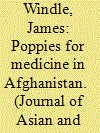

|
|
|
|
|
| Publication |
2011.
|
| Summary/Abstract |
This study examines India and Turkey as case studies relevant to the Senlis Council's 'poppies for medicine' proposal. The proposal is that Afghan farmers are licensed to produce opium for medical and scientific purposes. Here it is posited that the Senlis proposal neglects at least three key lessons from the Turkish and Indian experiences. First, not enough weight has been given to diversion from licit markets, as experienced in India. Second, both India and Turkey had significantly more efficient state institutions with authority over the licensed growing areas. Third, the proposal appears to overlook the fact that Turkey's successful transition was largely due to the use of the poppy straw method of opium production. It is concluded that, while innovative and creative policy proposals such as that of the Senlis proposal are required if Afghanistan is to move beyond its present problems, 'poppies for medicine' does not withstand evidence-based scrutiny.
|
|
|
|
|
|
|
|
|
|
|
|
|
|
|
|
| 9 |
ID:
109121
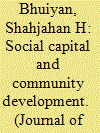

|
|
|
|
|
| Publication |
2011.
|
| Summary/Abstract |
This article explores the role of social capital in community development by focusing on two South Asian case studies drawn from India and Bangladesh. Both studies recognized social capital as a useful resource, which facilitates social interaction and promotes mutual support and cooperation and thus improves participants' livelihood through income generation, better community governance and capacity building. An important observation is that social capital yields superior outcome if it is used in line with the local conditions of a given society. The findings suggest lessons for policy planners, donor agencies, development practitioners, non-governmental organizations (NGOs) and civil society to use social capital as a resource in order to achieve sustainable community development.
|
|
|
|
|
|
|
|
|
|
|
|
|
|
|
|
| 10 |
ID:
109128


|
|
|
|
|
| Publication |
2011.
|
| Summary/Abstract |
Notwithstanding its destructive aspects, historical sociologists have severally used their work to establish that warfare has its constructive side especially in the realm of state building. Through their work, the literature in the sub-specialty is continuously updated with narratives and accounts of war making and state building in Europe and parts of Asia during the early modern era. Such narratives and accounts are troves of information that enrich our knowledge about the trajectories and processes through which the states that we know today in Europe, China and Japan came about. But the neglect of Africa, where states were also built through warfare by indigenous political actors, remains conspicuous in the sub-specialty literature. This article, which begins the process of redressing that neglect, extends Charles Tilly's theoretical proposition on the symbiotic interaction between war making and state making in early modern Europe to account for the emergence of states in Yorubaland during the Common Era and up until the 1800s using the wealth that accrued from slave-taking and other sources. It draws from the Eckstein-Gurr theoretical framework - or E-G scheme - to show that although those Yoruba states were monarchies, they were also constitutional monarchies that thrived on democratic sociocultural authority patterns of the Yoruba.
|
|
|
|
|
|
|
|
|
|
|
|
|
|
|
|
|
|
|
|
|